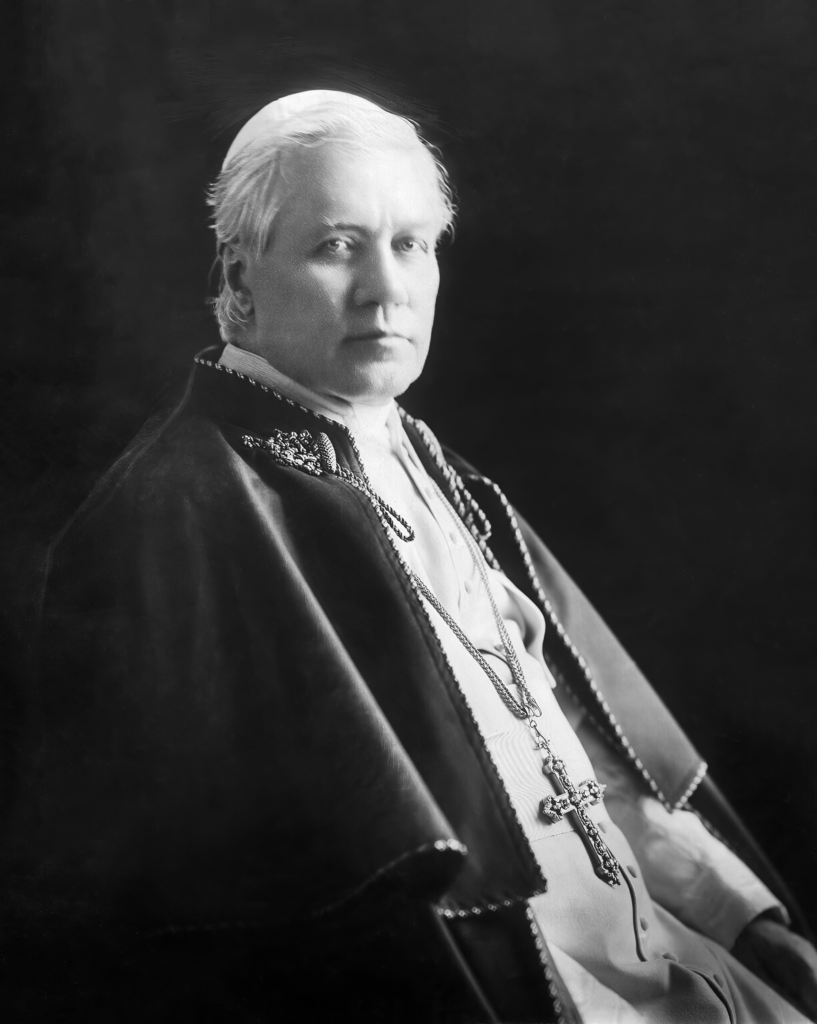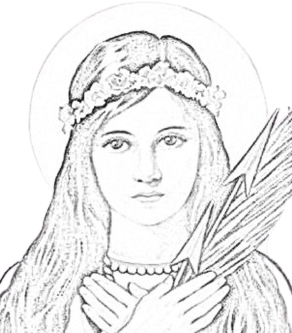
Pope St Pius X
Giuseppe Melchiorre Sarto
Born: June 2nd 1835
Died: August 20th 1914
Feast: September 3, August 21st (NO)
“O God, who for the defense of the Catholic Faith and the restoration of all things in Christ didst fill Saint Pius, Supreme Pontiff, with heavenly wisdom and apostolic courage: grant in Thy loving kindness that by following his teachings and examples we may attain eternal rewards. Through the same Jesus Christ, Thy Son, our Lord, Who lives and reigns with Thee in the unity of the Holy Spirit, God, forever and ever.” – Collect for St. Pius X, Pope and Confessor 9/03
Giuseppe Melchiorre Sarto, later Pope Pius X, was born to a poor but God fearing family in what today is Riese, Italy (Riese Pio X), he was the son Giovanni Battista Sarto, was a postman. He was a talented student at school, often having the highest grades of all his class.
From a young age he served as an acolyte, and went to Holy Mass daily and it became evident to everyone that he had a Priestly vocation, but his parents were poor and had to provide for eight children. The Patriarch of Venice intervened and gave Giuseppe a scholarship to attende the seminary at padua free of charge. He made the most of his studies, becoming the best student that seminary had ever seen.
He was ordained a Priest in 1858 after permission had come from Rome (since he wasn’t 24 yet). He sung Holy Mass for the first time, it was a joyful time for small village, especially for his Mother.
The first priestly assignment of Giuseppe was to be the curate of Tombolo, there help he labored much for the People and for the greater glory of God. He opened a night school to teach the villagers to read and write, and helped them overcome their vice of swearing. The Pastor of the Church once said of him.
At every post he held he was labored tirelessly, performing great works of charity. The humble, brave Priest cried when it was announced to him that he was to be consecrated a bishop, he wrote to Rome to explain to them why they should change their mind. Pope Leo XIII replied with one word — Obey.
Sarto was consecrated a Bishop in 1884, and was appointed Bishop of Mantua. As a Bishop he took great care of the poor despite being in poverty himself. He labored for the salvation of souls, taking great care of the seminary and reforming it gathering man candidates for the Priest hood, once again working hard to spread higher devotion to God, especially to the Holy Sacraments. Eventually, he was elevated to be the Cardinal-Patriarch of Venice.
At Venice he conveyed a Eucharistic Congress to increase devotion and adoration to Jesus Chirst in the Most Blessed Sacrament of the Eucharist. Cardinal Sarto even invited Catholics of the Byzantine and Armenian Rites to participate.
Pope Leo XIII died in July 1903. He set off for Rome to participate in the conclave to elect a new Pope. Cardinal Sarto had no intention to become Pope, as he once said “Better dead than Pope” and when talking to Cardinal Victor-Lucien-Sulpice Lécot about the possibility of him becoming Pope he replied “Thanks be to God, I have no desire to be Pope.” A few days into the conclave, it became evident that Cardinal Sarto was going to be elected Pope. He Pleaded with his fellow Cardinal to reconsider, saying “I am unworthy, I am not qualified. Forget me” The Cardinal urged Cardinal Sarto to not refuse the papacy if he was elected.
After much exhorted and having received sufficient votes, the humble Cardinal reluctantly accepted the cross God was calling him to bear. The Cardinals asked him what name he would take he replied “Pius” “As I shall suffer, I shall take the name of those Popes who also suffered”.
The Papacy of Pope Pius X introduced my reforms, he expanded the use of the Gregorian Chant as it is the music that is the most adequate for theSupreme Worship of God in the Most Holy Sacrifice of the Mass. He forbade the use of opera at Holy Mass which is liturgical abuse.
Pius X is known as the Pope of the Eucharist, he encouraged frequent use of the sacraments, especially the Holy Eucharist for all those who were well disposed as well as frequent confession, as a means to best prepare ourselves for Holy Communion.
He chose the name of the error of his day (And which still affects us), Modernism. Which Pius Called the synthesis of all heresies. It stems from three main errors, the religious errors of Protestant revolution, the philosophical errors of the ‘enlightenment’ and the social errors of the French revolution and Masonic socialism. Another way this error can be thought of is ‘all religions are are good’ ‘we can attain salvation through these, in my own way’
With two encyclicals Pascendi Dominici Gregis and Lamentabili Sane Exitu, Pope Pius X killed modernism. But he knew that Modernism would return at a later date.
Pius X was filled with sorrow at the thought of so many people killing themselves at the start of the great war. He became sick on the Vigil of the Assumption and died August 20 1914 during the octave of the Assumption.
_________________________________________________________________
